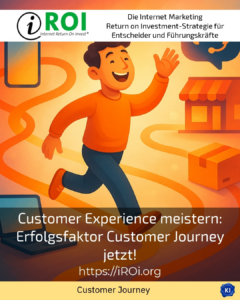Shaping cultural transformation as a long-term process
Companies are facing the growing challenge of anchoring their cultural change in a sustainable way. Cultural transformation means changing existing values, behaviours and working methods over time. This is not just about new processes, but also about how employees experience and live new ways of thinking and acting. Decision-makers often report that they would like support not only to initiate these far-reaching changes, but also to accompany and promote them in a targeted manner.
The introduction of new cultural principles requires sensitivity and time. Processes of cultural transformation must be understood by those responsible as an accompanying process that provides impetus and supports developments rather than promising quick solutions. This creates a reliable basis that encompasses the entire organisation and enables deep anchoring.
Step 4: Consolidate cultural transformation through integration
The integration of new ways of thinking and behaviour is an essential step in cultural transformation. The focus here is on permanently anchoring them in everyday working life. Decision-makers should promote an innovation-friendly attitude that includes open communication and a willingness to experiment. Culture is not perceived as an external element, but as a natural part of everyday organisational life.
An example from industry shows how important the gradual involvement of employees is. In a manufacturing company, the acceptance of data-based decisions was increased with workshops and accompanying discussions. This enabled employees to better understand the practical benefits and gain their own experience.
KIROI BEST PRACTICE at company XYZ (name changed due to NDA contract) The support provided by the coaching team helped the management level to reorganise the collaboration of hybrid teams. Targeted moderation and reflection sessions were used to convey the importance of appreciative communication, which noticeably improved collaboration and strengthened the climate for innovation.
Service companies also utilise this approach: agile methods have not only been introduced, but also made visible through ongoing training and success stories. This promotes acceptance of the cultural transformation and has a long-term positive effect on customer satisfaction and employee motivation.
The role of managers in cultural transformation
Without continuous commitment from the management team, the cultural transformation threatens to remain superficial. Managers need concrete impetus to recognise and practically implement their tasks in the transformation. Support is often required in order to adapt one's own leadership role to new requirements and to bring employees along with them. The active involvement of all those involved plays a major role here, as does the constant scrutinising of progress and resistance.
A practical example shows how a production company changed its internal communication through targeted coaching. Employees felt more involved and collaboration became more efficient. Another example from the service sector illustrates how regular workshops improved the dialogue between departments and thus actively shaped the culture. In the IT sector, a more open error culture encouraged innovation with the help of customised management tools.
KIROI BEST PRACTICE at company XYZ (name changed due to NDA contract) In a medium-sized company, managers were trained to lead open dialogue rounds. The aim was to communicate new values authentically and create a shared sense of responsibility. Employees also had the opportunity to contribute their perspectives. This led to the development of a corporate culture that sees change as a joint project and strengthens the ability to react to market changes.
Cultural transformation: challenges and opportunities for decision-makers
Many decision-makers are faced with the challenge of shaping cultural transformation in such a way that it not only achieves short-term effects, but also has a long-term impact. It's about striking a balance between the tried and tested and the new, which always creates uncertainty. This is why those in charge often want guidance on how to accompany the change carefully but consistently. A sensitive approach is necessary in order to recognise resistance and deal with it productively.
Actively shaping the change process with participative formats and continuous communication has proven to be effective. This creates a shared understanding that supports and helps to shape the cultural transformation. The KIROI method accompanies this process as a supportive tool that provides impetus and, together with those responsible, designs the steps for successful cultural change.
My analysis
Cultural transformation is not a singular event, but a sustainable process that is characterised by conscious integration and active management. Decision-makers benefit from structured support that helps them to gradually introduce new ideas and embed them over a longer period of time. Success depends largely on how managers fulfil their role and actively involve employees. KIROI offers valuable impetus and support to systematically shape cultural change.
Further links from the text above:
[1] Challenges and integration in cultural transformation
[3] KIROI Step 4: Actively shaping cultural transformation
For more information and if you have any questions, please contact Contact us on the topic or read more blog posts on the topic Artificial Intelligence Blog here.














